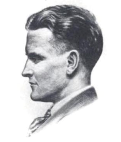The Great Gatsby by F. Scott Fitzgerald
Page 11 of 25 - 1 2 3 4 5 6 7 8 9 10 11 12 13 14 15 16 17 18 19 20 21 22 23 24 25 Purchase full notes for £6.95 (aprox $10.84)
8 ‘the hard rock or the wet marshes’ – Nick’s image implies that, at root, the hierarchy of moral values is essentially ‘social’, in that it is fundamentally based upon a person’s background. His experience at West Egg has led to a solidly reactionary Middle-Western view: he wants ‘the world to be in uniform and at a sort of moral attention forever.’
8 ‘back from the East’ – This refers literally, of course, to the East Coast of America, but there is also a faintly Romantic sense of oriental extravagance implied by ‘the East’ here.
8 ‘I wanted no more riotous excursions with privileged glimpses into the human heart.’ – A sentence clearly designed to pique the reader’s interest.
8 ‘Gatsby, who represented everything for which I have an unaffected scorn.’ – Fitzgerald’s layering is complex. According to Nick’s title, Gatsby is ‘Great’. Such an assertion could still be ironic, but as Nick has just stated that Gatsby ‘was exempt’ to his negative ‘reaction’ to the East Coast, it seems likely that his feelings about Gatsby remain positive, at the very least. The phase ‘I have an unaffected scorn,’ however, is in the present tense, and so must refer to Nick’s considered view as the ‘older and wiser’ narrator. The key to this little mystery is perhaps the word ‘represented’. What Gatsby ‘represented’ merits Nick’s scorn, but that leaves room for an essence or a core to the man that might fairly be described as great. Whatever the precise meaning, Fitzgerald’s purpose is to deploy potentially contradictory statements and notions in a manner designed to make the reader distrustful of Nick’s narration and unsure of what precisely is being communicated by his words: the implication being that it is necessary to read between the lines of this novel if the ‘truth’ is to be discerned. It is possible, for example, that his encounter with Gatsby rather radically challenged Nick’s Middle-Western moral certainties, but the narrator appears to be either unaware of this or unwilling to openly admit it.
8 ‘If personality is an unbroken series of successful gestures’ – Nick floats the idea that our character is something created by ourselves and ‘read’ by others. This is a good example of the way in which his experiences of the world might have shaken his more straightforward Middle-Western views – he is, apparently, open to a much more fluid account of human behaviour – and Gatsby himself – the ‘bouncing man’ – epitomises the notion of a man defining himself by ‘an unbroken series of successful gestures’. Nick may even be implying that our ‘personhood’ itself is something that we create.
[…]

